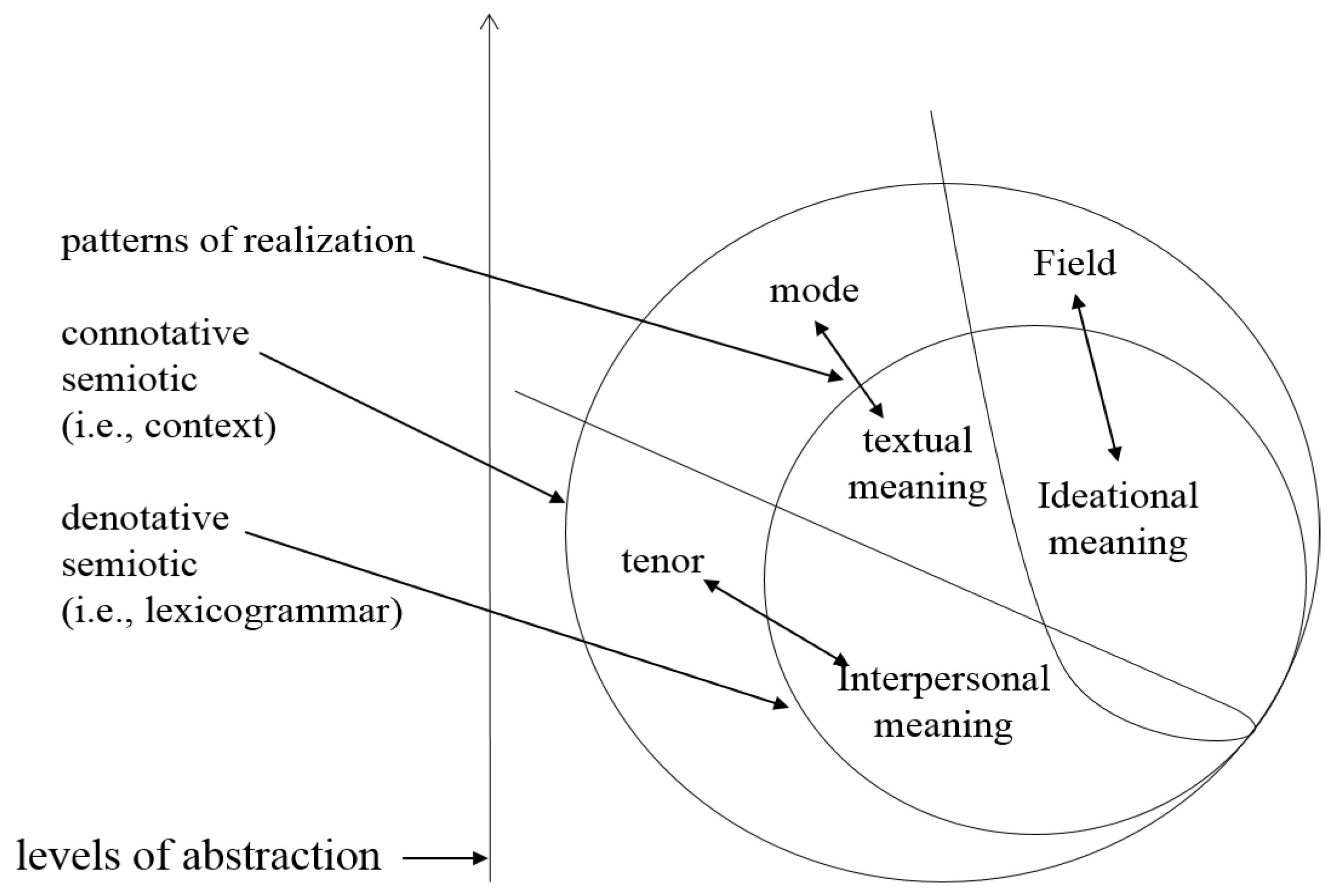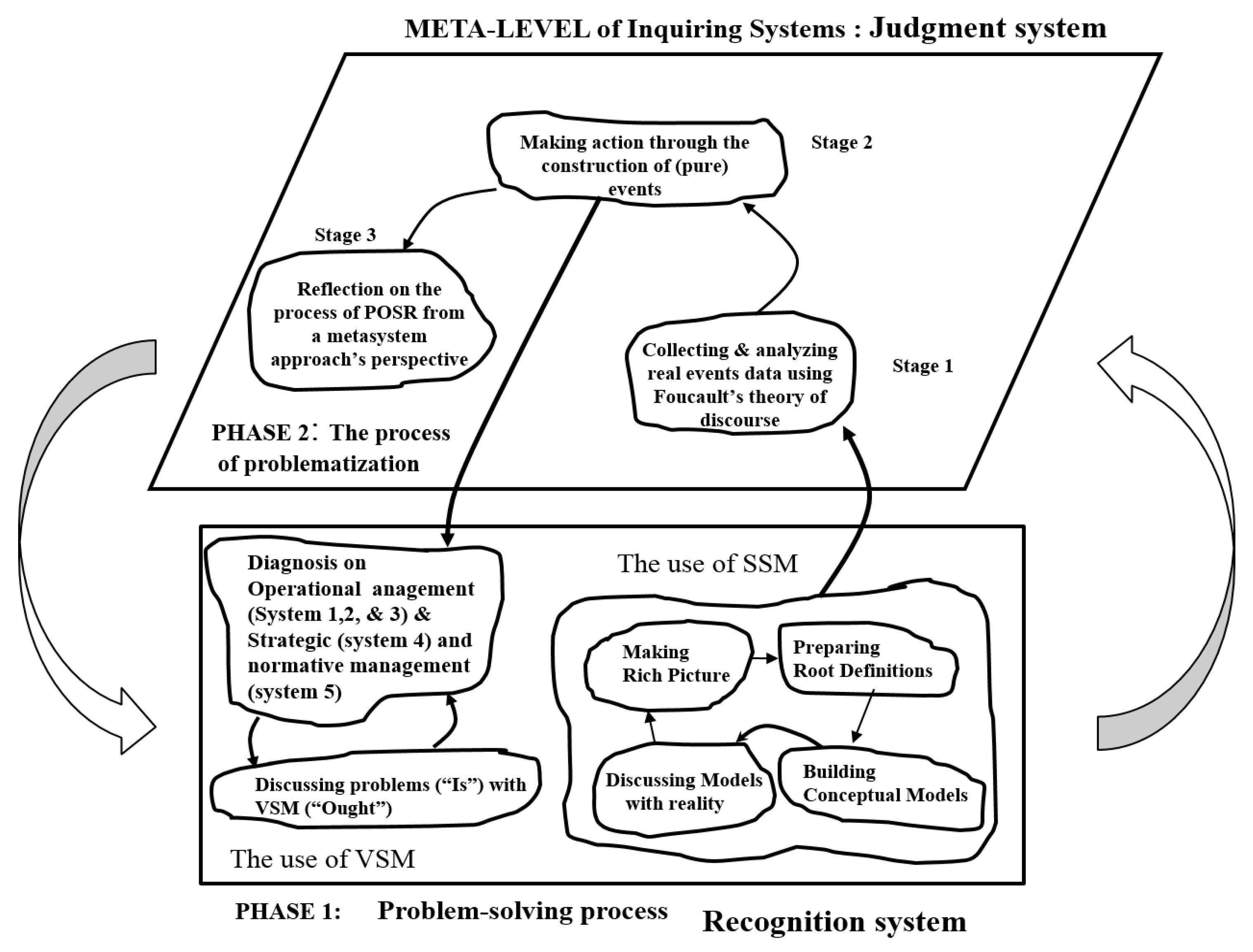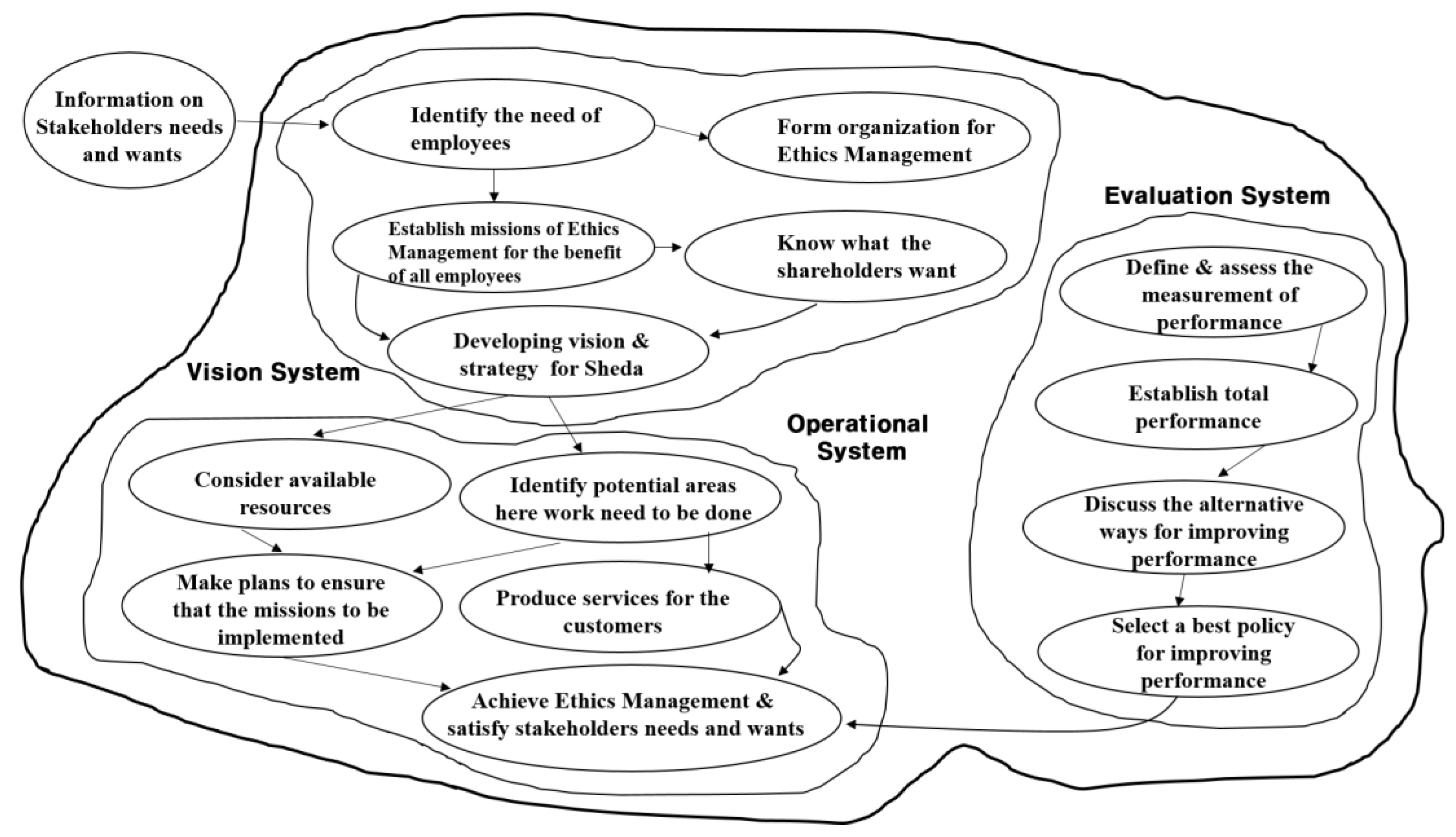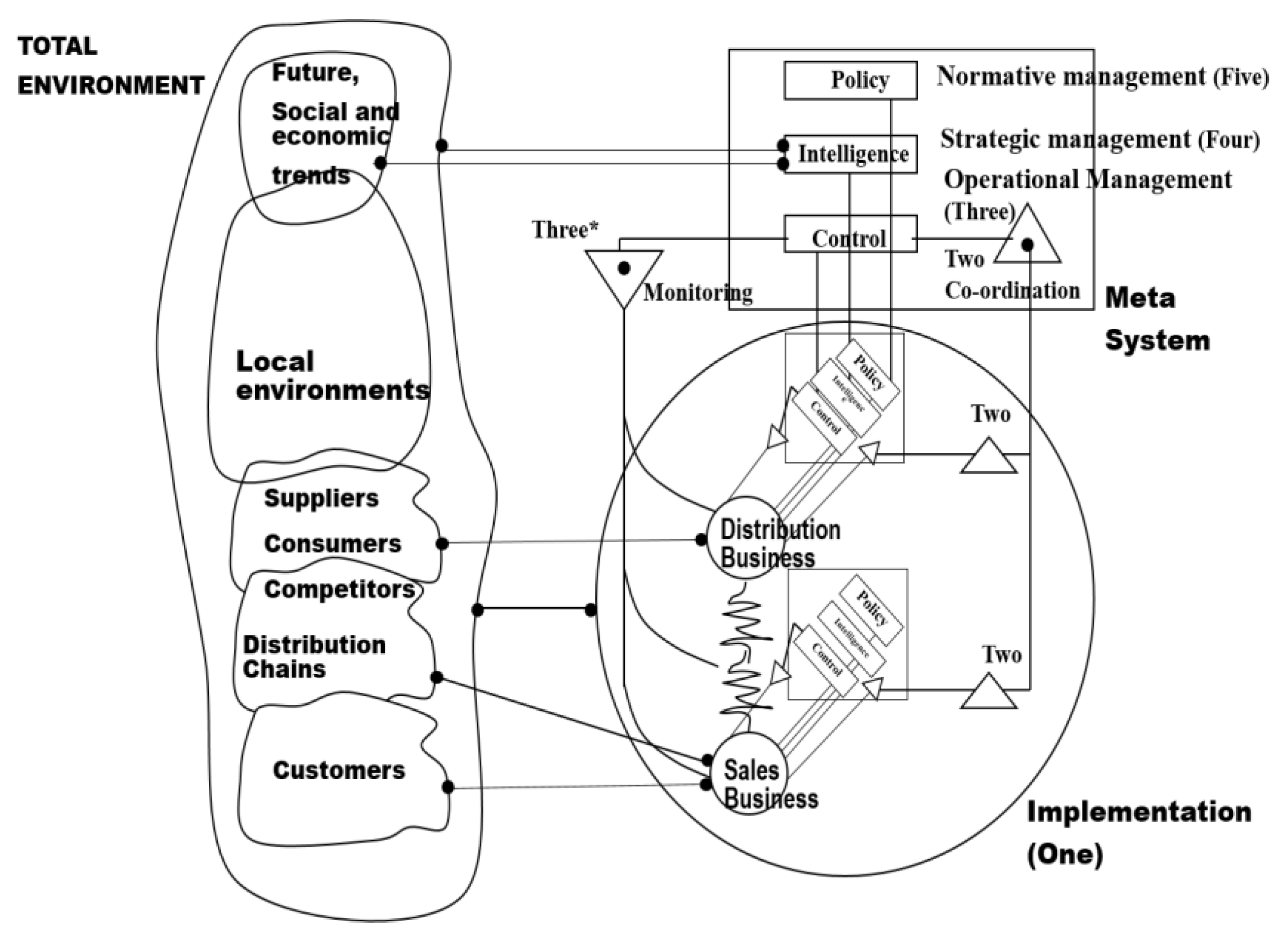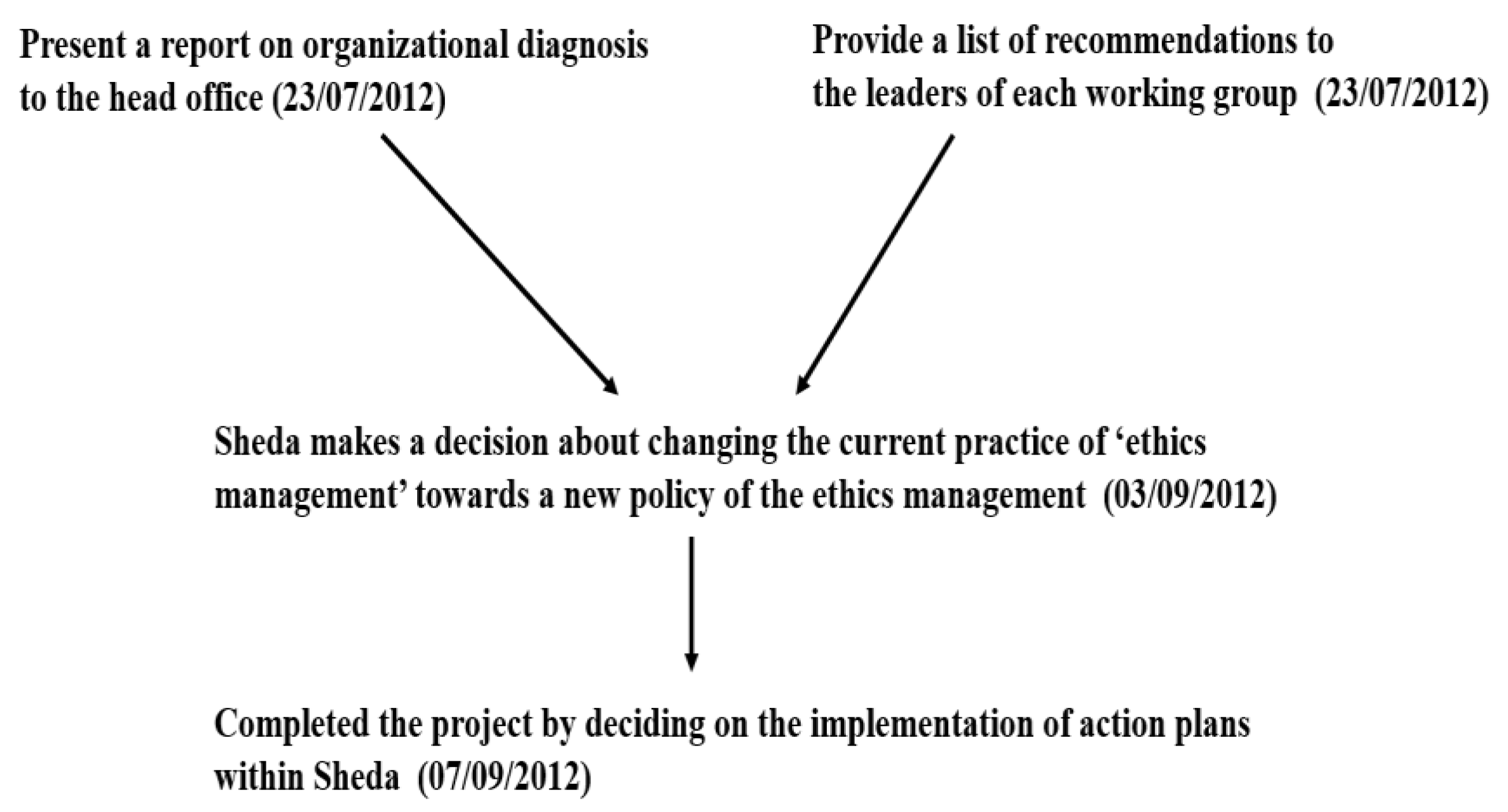3.2.2. Phase 2: The Process of Problematization
During the problem-solving process of POSR, power is operated as problem-solving inevitably has an effect on the existing power relations within Sheda. Forms of power, therefore, should be studied as they manifest themselves during the problem-solving process using SSM. According to Foucault [
23], power is viewed as positive and productive, as well as embedded in the stage of making ‘observations’. The observations taking place during the problem-solving process of POSR became the source for identifying power as it is actually exercised in the setting of the project from the micro analysis’s view of power [
23]. Investigating the forms of power inside and outside the organizational boundary of Sheda, appreciators examined other sources where such forms of power might be found. For instance, as the social appreciation evolved and continued through the interacting flux of ‘systems ideas’ (e.g., the use of SSM) and events that had happened inside and outside the organizational boundaries of Sheda. The appreciators identified and collected real events that had happened during the process of problematization. This led to the meta-level process of problematization, which is concerned with ‘action’ through the collection and analysis of ‘real events’ data and the construction of ‘pure events’ by participants. Such sources of reference may be proved useful in identifying hidden manifestation of power, which cannot be identified during the problem-solving process using SSM. In Phase 2, there are the following two stages of taking ‘action’, in the terms of de Zeeuw [
30], and subsequently reflecting on the process of POSR from a metasystem approach perspective.
Stage 1: Collecting and Analyzing ‘Real Events’ Data Using Foucault’s Theory of Discourse from a CDA’s Perspective
In stage 1, real events data were collected through observation and appreciation of “what happens” within practice. The purpose of collecting and analyzing events data is to investigate “what happens” from CDA and SFL’s perspectives. Real events data collected are given as follows.
Event 1: President Mr. Y. J. Jung held a formal meeting with board of directors and operational managers and other employees in Sheda and declared a charter of “Ethics Management” on the morning 10 January 2012.
Event 2: Local independent distributors protest against the ‘corruption’ of activities at Sheda, they argued that Sheda did not follow and implement its code of conduct for “Ethics Management” and the principles of corporate social responsibility in Korean society, dated on 5 April 2012.
Event 3: President Mr. Y. J. Jung is negative about an incident in which local distributors have protested against the ‘ethics management’ of Sheda.
Event 4: Hangyere newspaper reported that some local distributors protested against the unethical behaviors of S-Mart and there have been damage to local distributors through the operation of S-Mart within the district of Kwang Weon Do, dated on 17 July 2012.
Mr. Jung believed that S-Mart (this is the one of ‘super super-market’ distributors which is operated by Sheda in Korea) should pursue “price destruction” and make significant changes in the Korean domestic retail business environment. As a result, many small domestic retail business companies and distributors went bankrupt, leaving many local people jobless. As of the end of 2012, Sheda grew significantly in South Korea, with 12,893 employees and 35% of the market share.
Analyzing events data using CDA involves three distinct steps [
8]. The first step of the analysis is to identify and classify the interpersonal elements and meaning in order to investigate a resource for the interpretation and negotiation of social relations concerned with the linguistic representation of interactional characteristics, with such key labels as Actors, Goals, Beneficiaries, and Agents. As a first step of the discourse analysis, appreciators have to identify experiential labels such as “Actor”, “Goal”, “Beneficiaries”, and “Agents”. The participatory source of actions and happening affecting other participant and one affected by the material process are called “Actor” and “Goal”, respectively. In the example of the Event 1 described above, President Mr. Jung (actor) declared (material process) the principles of “Ethics Management” (goal). “Beneficiaries” in the discourse analysis refer to those that are indirectly affected by the process. either positively or negatively, whilst “Agent” refers to those that act as cause for actions and happenings [
8]. In the example of events described above, “Beneficiaries” refer to full-time and part-time workers in Sheda (Event 1) whilst “Agents” refer to local distributors (Event 2), and the Hangyere newspaper (Event 4).
For the second step of the analysis, appreciators analyze actors’ language in terms of nominalization in order to investigate the interplay between processes (e.g., what is going on in a social situation; who is involved in it; who is affected by it) and participant’s roles and textual meta-function, which is concerned with the flow of interpersonal and ideational meanings and their organization into informational units within discursive practice (that is, a particular form of social practice). The nominalization refers to non-verbal elements being used in nominal forms [
8]. As a second step, Actors’ language use was analyzed in terms of nominalization. In the example of Event 1 described above, the president’s language use of “ethics management” was inappropriate where part-time workers and local distributors claimed “ethics management”; that is, the president’s own perception or interpretation of business ethics and corporate social responsibility that focus on “profit maximization” rather than “maximization of happiness of all stakeholders.” The president’s own use of ethics management became Sheda’s central moral philosophy and vision, which was to achieve such maximization using S-Mart’s misconduct in which S-Mart dumped price reductions of various products and put sales promotion costs on suppliers. This behavior caused damage to local distributors who protested against the unethical conduct of Sheda. As the third step, appreciators highlight some of the events data from CDA’s perspective in order to investigate conflict situations and power relations between the two groups of the powerful and powerless. For instance, in the example of Event 4 described above, Hangyere newspaper reported that there were social and economic issues caused by unethical actions performed by the powerful social entity and business company, Sheda and S-Mart, whereas there were issues about social movement initiated by the groups of the powerless, such as workers in Sheda and local distributors.
The third step of the analysis interprets and analyzes events data from CDA’s perspective in order to investigate conflict situations and/or power relations between the groups of the powerful and powerless or voiceless within social practice. In order to discuss the events that had happened, separate workshops were carried out with the group of the powerful (e.g., president, the boards of directors and senior managers from the head office) and the group of the powerless (e.g., operational managers, working staff, workers, and representatives from the independent local distributors). During the workshop the president made clear his intention to continue the vision of ethics management. The president express his opinion as follows, “ethics management at Sheda includes multiple levels of management, such as management for the respect for employees, customers, and business partners, and for the focus of shareholders and corporate social responsibility. Since some senior managers and working staff are negative about ‘ethics management’ within Sheda, there is no big impact of ethics management in the workplace.” On the other hand, the groups of the powerless had a significant concern about the philosophy and practice of ethics management within Sheda as the president imposed his philosophy of ‘business ethics’ that follows a priori ethical reasoning. According to senior staff, “as far as the ethics management is concerned, it focuses on punishment, correction, and coercive actions for ‘unethical’ behaviors in accordance with an ethical code of conducts within Sheda rather than business ethics where the criteria of good or bad is applied in practice”.
From CDA’s perspective, the patterns of language use between the president and senior staff reveal an interesting contrast. The president uses language as the actor of processes, whereas the senior staff uses language as the agent that that may act as a cause for actions and changes in social practice. Even the president of Sheda is a social entity with institutional and semiotic power, and the researcher raised the question of what kind of access people with different notions of power, and how language is a realization of such power as it construes the interpersonal relationships through the process of social appreciation. To answer this question, after the completion of the workshops, further processes of POSR took place, as explained in detail in the next stage.
Stage 2: Taking Action Through the Construction of ‘(Pure) Events’
• Second cycle of problem-solving process using VSM.
As social appreciation evolved through the interaction of ‘systems ideas’ and events unfolding over time, appreciators perceived some flux in the use of SSM (‘systems ideas’) and events. The analysis of events data became the input for ‘appreciative setting’ in the given situations (this is the current state of readiness of the mind to see and value things in one way rather than another; the readiness to see and value things are organized as a whole, as a system which is called appreciative setting or system [
14]. With the input from the flux of systems ideas and (real) events, social appreciation had the positive effect of change of perception amongst participants. As a result, the nature of social appreciation changed according to the perceived flux of ideas and events data collected. This led to the second cycle of the process using systems method (e.g., Beer’s [
35] viable system model) during stage 2 of the process of problematization. In other words, the outputs of the ‘judgement systems’, which contain the process of problematization, became the input for the ‘recognition system’ which contained the process of problem-solving.
As the researcher suggested, viable system model (VSM) is useful not only for making the responsibility of long-term economic success and viability, but also for taking on social responsibility for community and stakeholders [
36], participants agreed on the use of VSM with the goal of ‘systemic management’ through the multiple levels of management that involve the issues of operational, strategic, and normative management [
36]. A series of workshops were held to discuss the ‘core’ issues and diagnose problem situations using VSM. The details of the application of VSM are as follows:
The workshops approach provided a venue for learning ‘systems thinking,’ which was regarded as a conceptual tool for investigating the current situations within Sheda. Participants were involved in the process of using VSM to explore the problem situations within Sheda. They had different perceptions of the problem situations. The following quotations are representative of these varying perceptions: “As far as operation is concerned, the critical issue is how to change the operational management according to the current incorrect sales forecasts. We have no coherent procedures of controlling the various operational activities of distributions within Sheda.” “According to the current state of our business, we need to create a synergy between S-Mart and independent local distributors in which various working groups provide us with effective and flexible strategy for the future development of Sheda”. “With the guidance of ethics management, how can we create conditions for improving the performance of various operational divisions, working groups and the organization as a whole”? Participants discussed the identified perceived problem situations (“is”) and compared these situations with VSM (“ought”). The comparison between the perceived situations (“is”) and VSM allowed for the formation of a viable systems view in accordance with Ashby’s Law of Requisite Variety. According to Ashby’s [
37] Law of Requisite Variety, the variety that the organization sees in the environment should be equal to the variety in the organization. Using VSM diagnosis, the researcher suggested the following ‘solutions’ concerning multiple level of managements according to criteria of organizational fitness from VSM’s perspective. At the level of operational management, the ‘autonomous management’ (e.g., ‘implementation’, ‘coordination and regulation’, and ‘control’ functions in the terms of Beer’s [
35] VSM) should be introduced and implemented within various operational divisions and working groups in order to meet efficiency criteria.
The level of operational management that refers to Systems One (‘implementation’ function), Two (‘coordination and regulation’ function), and Three (‘control’ function) in VSM), the nature of viable systems is that they are able to maintain an autonomous existence [
35]. As identified at stage 1 of Phase 1, operational managers and working staff within various divisions tend to follow the ‘orders’ and guidance from the head office. They should function as what Beer [
38] calls the “autonomic management” of the organization (“Inside”). From VSM’s perspective, the autonomic management system (e.g., the three lower level of Systems One, Two, and Three) of Sheda does not have sufficient ‘requisite variety’ to deal with massive varieties that generate from environments.
At the level of strategic management, a new strategy is needed to develop human resources, ‘intangible assets’ for improving the core competency of Sheda, in order to meet the criterion of effectiveness. In the present situations, it was identified that there was no ‘intelligence’ function (that is, System Four in VSM) that deals with the total environment of Sheda in which System Four acted as an interface between high-level thinking and the rest of the organization. The head office has the ‘business ethics’ officers who are in charge of dealing with economic trends, social, industrial, and political situations (“Outside”) in Korea. They tended to follow the ‘orders’ and guidance from top managers, and they need to have the autonomy or empowerment from top managers in order to think and act autonomously or critically with regards to changing situations “Outside”. In addition, a strategic human resource development approach should be introduced to allow them to think and act by themselves without the interference from top management within Sheda.
At the level of normative management, a vision of ‘ethics management’ should be followed by the bottom-up approach, making consensus about the theory and practice of ‘ethics management’ necessary amongst all the employees within Sheda. This will give a sense of legitimacy the operating philosophy of ethics management within Sheda. In the sense of maintaining viability, System Five should act as what Espejo [
39] calls ‘the mechanism of organizational adaptation’, upon which effective organizational conversation depends on dialogical interactions amongst the autonomous groups which are capable of maintaining the organizational identity of Sheda. In the present situation, the top managers and head office dealing with the corporate decision-making were responsible for formulating the ethics management policy. This means that System Five did not appreciate the dialogical interactions amongst autonomous groups within Sheda. Bearing in mind the details of the three levels of operational, strategic, and normative managements of Sheda, VSM was envisaged as shown in
Figure 4.
At the end of the series of workshops, participants, which included senior managers and working staff within Sheda, discussed how to deal with the mismatch between real situations (“is”) and the possible ‘solutions’ of the VSM diagnosis (“ought”). Although they agreed there was consensus that something had to done in order to improve the problematic situations within Sheda, they had different views on how to deal with the mismatch between “is” and “ought”. For instance, the group of senior managers insisted on a top-down approach whilst the group of working staff wished to have bottom-up approach to dealing with those situations. These situations generated tension and conflict situations between the two groups of the powerful (e.g., the group of senior managers) and the powerless (e.g., the group of working staff). Subsequently, the situations caused the creation of a new mode of ‘appreciative setting’ within the model of social appreciation. The new mode of ‘appreciative setting’ became the source of creating ‘self-organization’ that brought people together to create ‘action’ that produced self-constructive ‘pure events’ using boundary critique (pure events refer to “incorporeal events” or “surface effects” which are caused by bodies or states of affairs. Pure events, as the Stoics and Deleuze understood them, elude the present, always what has happened or what is about to happen. It denoted them by means of infinitives. Without being subjective or objective, infinitives are determinate and specific and guarantee reversibility between future and past [
19]. Pure events can be created through the process of social appreciation [
5,
33]).
During the process problematization, social appreciation evolved and continued through the interacting flux of ‘systems ideas’ and events unfolding over time. The flux emerged from the use of VSM (‘systems idea’) concerning the events (specifically events 3 and 4 in Phase 2 of POSR). These events led participants to become ‘critical thinkers’ in order to investigate conflict situations from systemic perspectives. Drawing on boundary critiques, when appreciators identify there is a conflict between different groups of people, and they categorize the two groups of the powerful and powerless. During this stage, a series of events was produced in order to deal with those situations amongst participants who became ‘critical thinkers’. These events are given as follows.
Event 5: Present a report on the organizational diagnosis to the head office, dated on 23 July 2012.
Event 6: Provide a list of recommendations to the leaders of each working group, dated on 25 July 2012.
Event 7: Sheda makes a decision about changing the current practice of ‘ethics management’ towards a new policy of the ethics management which aims to benefit all workers of Sheda, independent business partners, and distributors dated on 3 September 2012.
Event 8: Complete the project by deciding on the implementation of action plans within Sheda, dated on 7 September 2012.
In the example of Event 8, conflict situations between the two groups of the powerful and powerless were resolved by actions from a powerful social entity, Sheda when the company decided on a revised action plan for implementing ‘ethics management’ within Sheda. In this phase, a series of events was appreciated through the connection between ‘singular points’ (that is, Deleuze’s sense of events) 5 and 6, and the conjunctive synthesis of the singular point 8 (
Figure 5).
Stage 3: Reflection on the process of POSR from a metasystem approach’s perspective.
As a result of the participatory process of POSR (see the process of POSR in
Figure 2), the evaluation of POSR from a metasystem approach perspective can be understood as follows: At level 1 of an inquiring system, it was identified that social reality is constructed by the ‘real world inquiring systems’ in which social appreciation took place to resolve the mismatch between problem situations (“is”) and systems ideas (“ought”). At level 2 of an inquiring system, it was identified that knowledge was constructed by the ‘science inquiring system’ (through the process of problem-solving) which was affected by the complex relations between discourse, or the use of language and power/knowledge dynamics within social practice. At level 3 of an inquiring system, it was identified that value was created by an epistemological inquiring system (through the meta-level process of problematization) that was created by the ‘judgement system’ (or ‘action’ in the terms of de Zeeuw [
30] which was linked with the ‘recognition system’ (or ‘observations’ in the terms of de Zeeuw [
30]) in the process of POSR. Thus, moral epistemology was concerned with social practice where the criteria of good or bad is applied rather than a priori ethical reasoning. In this sense, the value of POSR is that where the social appreciation takes place using Churchman’s philosophy, and a metasystem approach that makes sense from Deleuze’s theory of assemblages (or events), and Foucault’s theory of discourse and the use of systems methods (SSM and VSM), participants are enabled to take ‘action’ in order to bring about change in the organization. The action will produce a multiplicity of alternatives through openness to the question of “all chances and possibilities” within social practice [
20].
